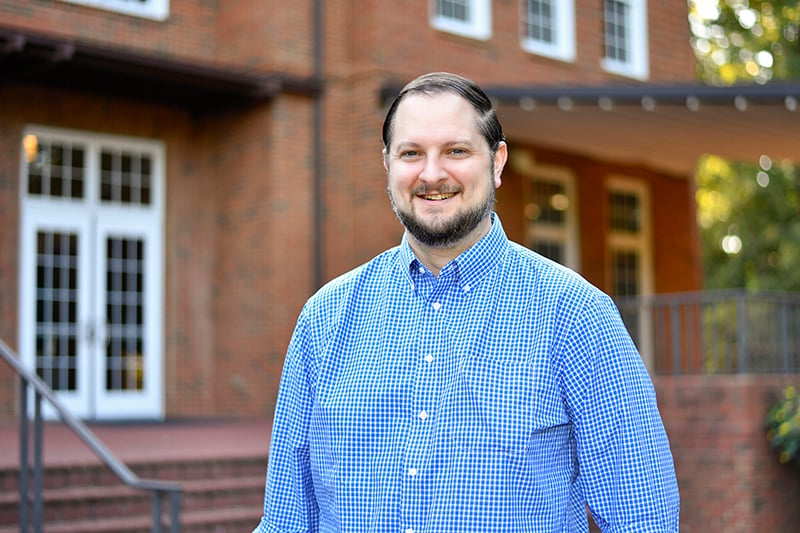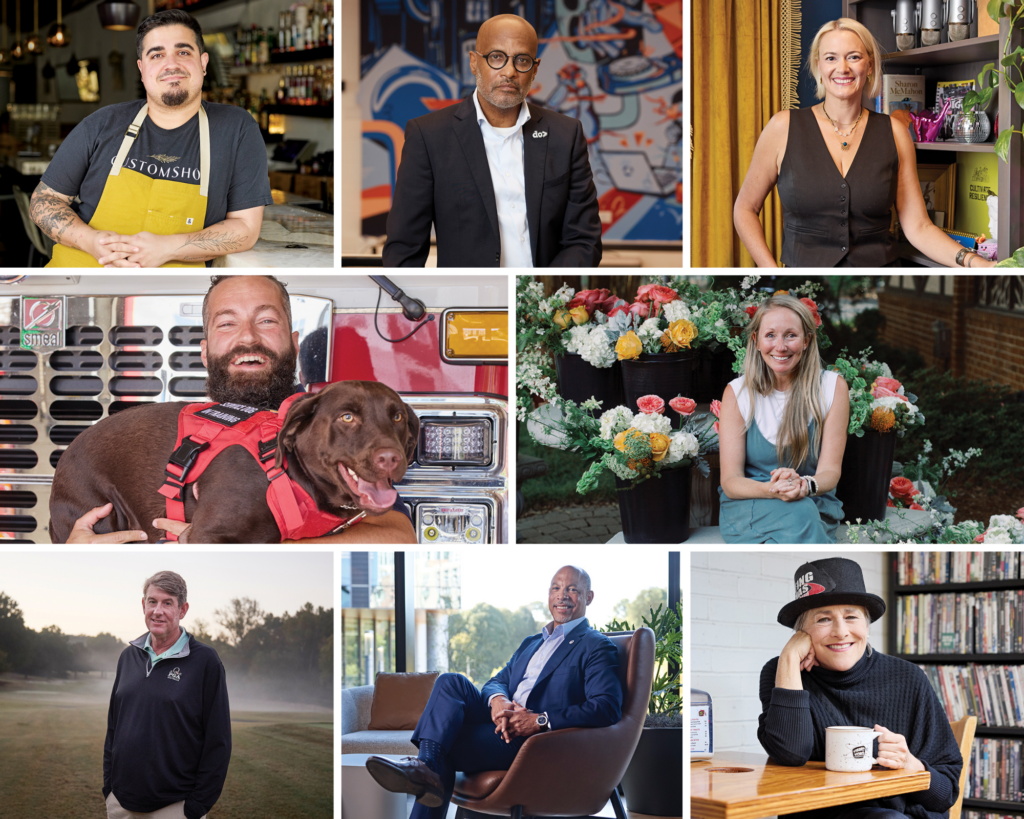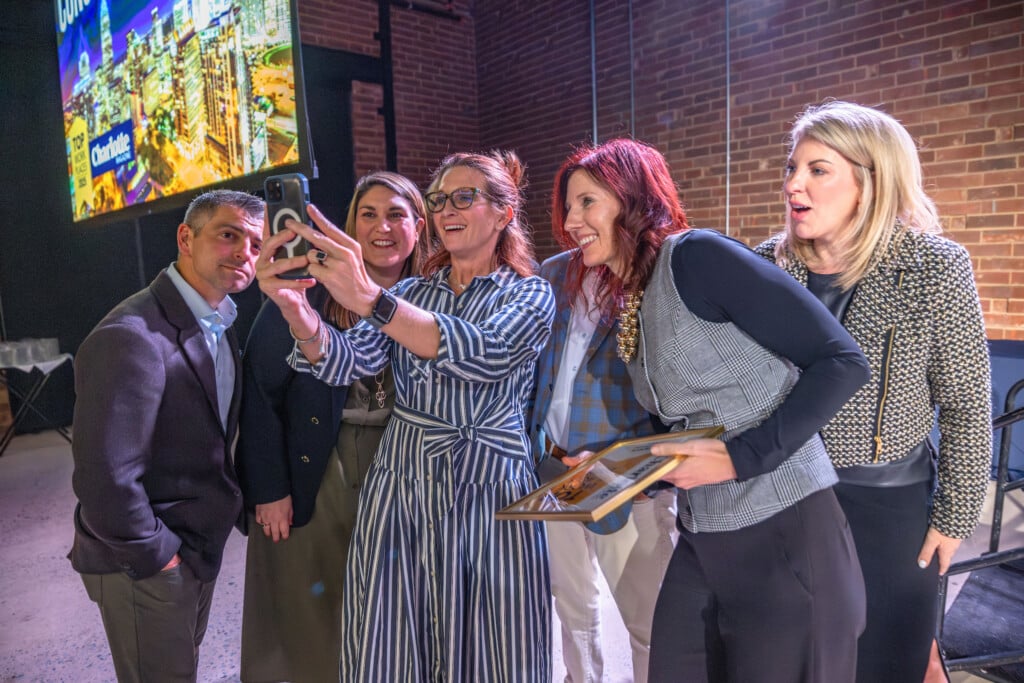Robert Cramer’s Career Mission Is Military Suicide Prevention
The UNC Charlotte professor develops a holistic program for mental health providers

Robert Cramer says he always knew what he was going to do. He just didn’t know the path there. “If you’re in the suicide prevention field, there’s always a story behind that,” he said. “One way or another, I always knew I would come back to it.”
Cramer is the Irwin Belk Distinguished Scholar of Health Research in the Department of Epidemiology and Community Health at UNC Charlotte. After years of boots-on-the-ground clinical psychology and forensics, he dove deep into the public health research he calls his “mission.” He’s developing suicide prevention training tools for the military and the North Carolina Department of Adult Correction. He’s also a member of UNCC’s Violence Prevention Center’s executive committee, and he’s spearheading therapy research funded by the Department of Defense for active-duty military members. “Service members,” Cramer says, “make the biggest sacrifice I can fathom.”
The sacrifice is mental and emotional as well as physical. Active members and veterans face combat, distance from family, and post-traumatic stress. These challenges, Cramer says, “can interfere with their ability to perform military operations and the transition back to civilian life.” His Core Competency Suicide Prevention Training program outlines 10 skills for clinicians and mental health providers. The research has taken him as far away as Finland and Australia to consult with clinicians at universities, hospitals, and prisons.
Before Cramer found his path, he grew up in New York, where friends who suffered from mental health issues led to an early interest in psychology. He earned a bachelor’s degree at Loyola University Maryland in 2004 and a doctorate at the University of Alabama in 2010, then worked at Sam Houston State University in Texas and the University of California San Francisco. But it was in 2015 at Old Dominion University in Norfolk, Virginia, the largest naval port in the world, that he found his focus on military suicide prevention. He joined the UNCC faculty in 2019.
He follows a philosophy of caring for the whole person—“cura personalis”—that he encountered at Loyola Maryland, a Jesuit institution. “What I can tell you is that we are saving lives and enhancing the quality of lives of service members,” Cramer said. “That’s worth the minutiae and the administrative nonsense that comes with higher ed.”
Here’s Cramer in his own words, edited for length and clarity.
I’m a product of two high school educators. My mom was a health teacher, and my dad was in the hard sciences and math. I’ve got a little bit of the science and the research, a little bit of the health care. Teaching is in my blood.
I went to (Loyola) as a psych major and followed the path. In psychology, you start with the study of the person. And for me, it was all about personality, debates about whether we could change as people.
I refer to Loyola as the best little mistake I ever made. I fell in with a mentor, Charlie LoPresto, who taught me how to see and think beyond myself and my privilege and to make a difference. I got exposed along the way to a lot of intangibles that really made me appreciate things like the value of lifelong mentorship, open-mindedness, and trying to learn from people different than myself. That’s what I’ve tried to carry forward in teaching and mentoring.
I think the in-classroom teaching is dwarfed by the mentoring. That’s where “cura personalis” shows up. Caring for the whole person is really about the technical skills, but it’s also about the personal and professional development.
I applied to grad school on two paths and ended up going the forensic route, which is law and the application of clinical psychology in legal contexts. My career has gone from clinical and forensic psychology, then to a faculty member in criminal justice.
It was very easy sometimes to feel trapped in this little forensic niche. With the trial work, I moved away from it because it felt soulless. I can remember in grad school asking my mentor: “How do you do this? How do you sleep at night?” In a criminal case, you may be hired by the defense, and that person is guilty of horrible crimes, and somehow you have to find the ability to just do the job regardless of what you know. That was not for me. I was shifting out of forensics.
Suicide prevention was always going to be it for me.
During my time at UCSF, I started doing suicide and violence prevention training research. That really laid the foundation. In 2012, my research team did a review of best practices in basic suicide prevention skills. We published a modest peer-reviewed article outlining suicide prevention competencies and a training model for graduate students in mental health disciplines.
That article changed my career. It launched the foundations of this training model I’ve implemented with the Department of Corrections here in North Carolina and the Navy. It established a training approach that has grown into several funded projects, launched much of my international work, and gave me a path to transition into public health.
I’ve been working with Naval Medical Center Portsmouth since 2017. For the last few years, I have led a multisite team to a $4 million, Department of Defense-funded clinical trial where we are testing a new group therapy for suicidal service members. It has been by far the most meaningful research work I do.
I have gotten to work with active-duty and civilian folks on that site, doing research to understand perceived coping and suicide risk, how firearm access might enhance risk. What we find is the better the coping beliefs are, the less risk (one) has for suicide and related conditions. If we can intervene therapeutically and build beliefs about their ability to use coping skills, we might be able to reduce suicide risk.
I have done work in Finland, Scotland, England, Australia, the Czech Republic. In England, I provided a series of seminars and trainings and consulted with a forensic hospital in the U.K.’s National Health Service. It led to a study on staff well-being and development of a suicide prevention clinical practice tool.
We have established a violence prevention center at UNC Charlotte. We’ve started a training series that’s been community-facing, forming local partnerships with Charlotte Public Health and the Department of Public Health and Violence Prevention.
My doctoral mentor really instilled in me: Take some chances; have a little courage. The worst that’s going to happen by applying to something or throwing your name into the hat is that you’ve lost a little bit of time. That lesson has sent me around the world.
I went with the opportunities that were put in front of me. That, too, was instilled in me by an undergraduate mentor and then my doctoral mentor. There are going to be doors open as you do things. Move around, collaborate, say yes.
I am not big on company loyalty. I am big on finding your people and staying loyal to them. I am fiercely defensive of my military and correctional partners. I find that loyalty is something that has fallen to the wayside. I will advocate, speak my mind to the detriment of myself sometimes, or to the disgruntledness of some leadership. But I don’t believe in being silent. I don’t believe in being on the sideline in any way, shape, or form.
I hope that whichever field, like clinical and forensic psychology and public health, that my mentees are going into, I’ve been able to make a difference that way. That, for me personally and professionally, will be the closest I get to progeny or legacy. I want to leave a small scar on the progress in suicide prevention.





